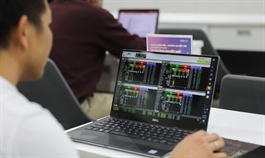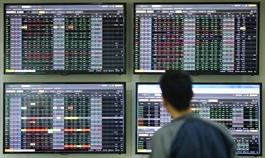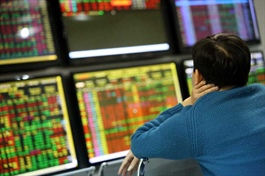Stock market a favoured investment channel for local investors
Stock market a favoured investment channel for local investors
The stock market is becoming a favoured and profitable investment channel for investors amid the COVID-19 pandemic but it also poses many challenges for regulators and market members.

Money flowing into the stock market comes from many different channels and mainly from domestic investors. The stock market has lured massive participation of "F0" investors (people participating in the market for the first time) entering the market from early 2020, when the COVID-19 pandemic first spread.
The number of new accounts opened in August soared to 120,500, many of which were individual investors.
The strong cash flow flooding the stock market in August has spurred market liquidity. In August, the average trading value per session on HOSE via matching transactions reached VND21.7 trillion (US$954 million), up 15.9 per cent compared to the previous month. For eight months, HOSE recorded an average trading value of VND17.9 trillion per session, up 375 per cent over the same period last year.
An F0 investor from HCM City told tinnhanhchungkhoan.vn that he had just joined the market three months ago. The pandemic had forced him to close his restaurant. This investor spent VND3 billion and in August recorded a profit of more than VND200 million.
His group of friends, who were real estate investors, have also invested in stocks, some of whom have many years of experience but some others have just joined for a few months. Their accounts all had over VND5 billion, he said.
Not only individual investors, but many businesses also participated in this channel.
Nguyen Xuan Phu, Chairman of Sunhouse Group, said the group had a department in charge of analysing securities investment opportunities. In 2020, the profit from securities investment accounted for about 30 per cent of the group's profit.
Many investors believe that there are short waves in the market at the moment, so it is possible to apply the market strategy to buy in every 5-10 per cent adjustment, then consider selling at the 1,350 area. It was the abundant cash flow and the love of surfing that created the excitement of the market.
Vinh Hoan Joint Stock Company (VHC) has spent VND57 billion in stocks and VND50 billion in bonds, disbursing into three stocks of Kinh Bac Group (KBC), Vietinbank (CTG) and Dat Xanh Real Estate Services JSC (DXS).
Tran Phu Electromechanical Joint Stock Company also has started investing in securities in the first half of 2021. As of June 30, this company owns 2.47 million Refrigeration Electrical Engineering Corporation (REE) shares with an initial price of VND124 billion, the value is now VND143 billion, equivalent to a temporary profit of VND9 billion.
Stanley Chou, Chairman of Vietnam Enterprise Investments Ltd (VEIL), a fund managed by Dragon Capital, said that the complicated development of the fourth COVID-19 wave would cause certain uncertainties to the economy in the second half of this year and the following years.
GDP growth forecast was also adjusted from six per cent to five per cent to match the current situation, he said
In the face of efforts to accelerate vaccination and disease control, the macroeconomic picture will become promising. Currently, VEIL's investment management team is finding stocks with long-term growth and new opportunities from the IPO market.
Nguyen Thi Phuong Lam, Analysis Director of Viet Dragon Securities Company, said the economy will gradually reopen in the fourth quarter of 2021 and vaccines play a key role to protect COVID-19 patients from the risk of severe conditions.
She said the authorities of HCM City can consider opening the economy regarding each industry and field. Companies operating in sectors that have been deemed as essential such as food processing, transportation, healthcare and e-commerce will reopen sooner.
“FDI companies and export companies play a pivotal role in the national economy, so these companies should be the target of concern in the first round of re-opening," Lam said.
“Resuming businesses will face difficulties in terms of workforce availability or challenges in the application of safety regulations in production plants.
“The supply chain will not immediately be smooth as the opening takes place unevenly in provinces and cities. This can also lead to difficulties in short-term shortages or delays in the supply of input materials.
“Many long-term investors believe that the cash flow in the market is highly speculative, posing a potential risk as if there is just one piece of negative information, there will immediately be a massive sell-off,” she said.
Le Quang Minh, Analysis Director of Mirae Asset Vietnam Securities Company, said that pandemic and stricter distancing measures had put great pressure on third-quarter business results. Earning per share (EPS) in the second half of this year will increase by nearly 12 per cent compared to last year, he said.
EPS growth this year is forecast at around 33 per cent. In a worse scenario where distancing measures extend to the fourth quarter, EPS growth for the year will be adjusted to about 26 per cent.
Another factor that can affect cash flow in the post-lockdown market is that many investors have expressed their intention to withdraw a part of their money from the stock market to invest in real estate, or to return to their main business activity.
Minh expects that the two main export markets - the US and China - will continue to boost Viet Nam's exports in 2021 and the following years.
“Export growth will gradually regain its momentum as the implementation of vaccination programmes are sped up in industrial parks and economic hubs. In the context of exports being promoted, industries such as seaports, logistics will benefit,” he said.




























